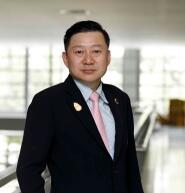Keynote Speaker---Dr. Chetneti Srisa-An

Dr. Chetneti Srisa-An, College of Digital Innovation and Information Technology, Rangsit University, Thailand
Biography: Chetneti Srisa-an is an Assistant Professor and now the Dean of College of Digital Innovation and Information Technology, Rangsit University, Thailand. Dr. Srisa-an is the leading innovator and pioneer of start-ups in Thailand. Dr. Srisa-an worked as the Deputy Managing Director (DMD) at Advanced Research Group Co., Ltd. from 2011 to 2014; the Dean of Faculty of Information Technology at Rangsit University from 2004 to 2010; the Director of Computer Science Program at Rangsit University from 2002 to 2004; the Senior Software Manager of E-Commerce Department at United Airline from 2000 to 2002; the Oracle Database Administrator and IT Production Manager at Hypermedia Publishing Co., Ltd from 1997 to 2000; and the Technical Development Manager at AsiaInfonet Thailand Co., Ltd. from 1995 to 1997, respectively.
Dr. Srisa-an received the Bachelor of Engineering degree in Communication and Electrical Engineer from Chiang Mai University, Thailand; the Master of Business Administration (MBA) in Finance from Institute Loyola University of Chicago, Chicago, USA; the Master of Science and the PhD degrees in Computer Science from Institute Illinois Institute of Technology, Chicago, USA, respectively.
Dr. Srisa-an’s current research interests include several areas of Data Mining, Big Data, Artificial Intelligent (AI), and Machine Learning. He published in numerous journal papers and international conferences. His recent publications include “A Classification of Internet Pornographic Images” published in the International Journal of Electronic Commerce Studies (IJECS); “A Performance Evaluation of Vulnerability Detection: NetClarity Audito, Nessus, and Retina”, published in the International Journal of Computer Science and Network Security (IJCSNS); “Applying Spanning Tree Graph Theory for Automatic Database Normalization”, published in the International Journal of Computer, Information, Systems and Control Engineering; “An Ontology based Knowledge Management for a User Preference of E-Learning System”, presented at the 8th Knowledge Management International Conference; “A Location Based Mobile Community Using Ant-Based Clustering Algorithm”, presented at the International Conference on Internet Studies; and “Applying Genetic Network Programming for a Nude Image Classification”, presented at the 19th International Conference on Management and Information Technology (ICMIT), respectively.
Speech Title: RSU-AI-Monitoring System for Mobile Personalized Learning
Abstract: Machine learning and AI allowed researchers to view and analyze student patterns like never before. By monitoring the students online, teachers can before-hand assist those who need some advices. Rangsit University-Artificial Intelligence-Monitoring System aka RSU-AI-Monitoring System is an effective tool for behavior monitoring changes. RSU-AI-Monitoring System has two components: measurement and evaluation. RSU-AI-Monitoring System can track many attributes on user activities logs; such as attendances, quiz marks, logins and logouts timestamps, IP address, and user names. Those students who have been measured and paid close attention to selected behaviors; often react to this monitoring information by changing their behaviors in the desired direction. This research aims to trace and direct students online to the selected behaviors. Our experiments trace and track on two major courses; which are THAI106 and ENG101. These courses are general education courses offering online. The students can access these courses via their mobile devices on RSU electronic learning (elearning). The student can: (1) measure and record his or her own behavior (measurement); and (2) compare the recorded behavior to a pre-determined standard (evaluation). Sample data are collected from more than 1000 students in the same semester. Our experiments revealed a good progress on the overall student’s final examination marks. The findings indicated that there are more than 50% improvement between the midterm and the final scores.